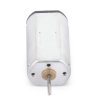nichukabra
New Member
Hi all,
I'll start off by apologizing for my lack of knowledge on the subject of electronics but I need your help.
I am looking for a replacement DC motor that came out of a miniature face massager. Upon inspection of the motor, I could not find any specifications on it in order to buy the replacement.
Could anyone advise me on the tests that I have to do in order to get some specifications of it? I have a multi meter in my possession along with a spare 3.7v, 135 mAh, 0.50Wh battery that is used to provide power.
I should probably note that the motor does not have much physical resistance while rotating it by hand (unlike the motors of the same size found in RC cars/drones).
I appreciate any help/guidance that I can get in determining what this thing is so that I can find a replacement.
Photo attached
I'll start off by apologizing for my lack of knowledge on the subject of electronics but I need your help.
I am looking for a replacement DC motor that came out of a miniature face massager. Upon inspection of the motor, I could not find any specifications on it in order to buy the replacement.
Could anyone advise me on the tests that I have to do in order to get some specifications of it? I have a multi meter in my possession along with a spare 3.7v, 135 mAh, 0.50Wh battery that is used to provide power.
I should probably note that the motor does not have much physical resistance while rotating it by hand (unlike the motors of the same size found in RC cars/drones).
I appreciate any help/guidance that I can get in determining what this thing is so that I can find a replacement.
Photo attached



